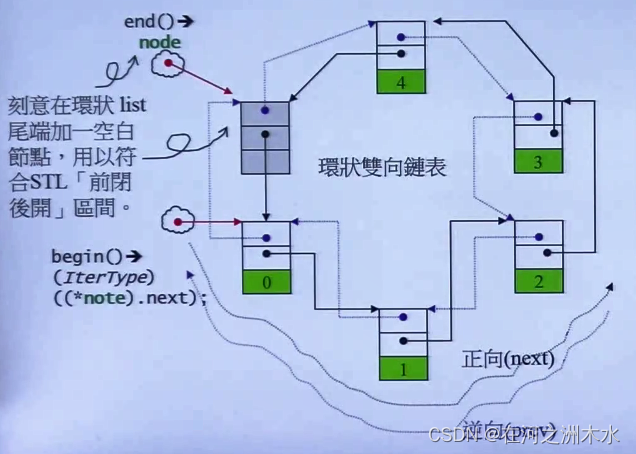C++ 学习系列 -- std::list
一 std::list 介绍
list 是 c++ 中的序列式容器,其实现是双向链表,每个元素都有两个指针,分别指向前一个节点与后一个节点
链表与数组都是计算机常用的内存数据结构,与数组连续内存空间不一样的地方在于,链表的空间是不连续的,链表是将一块块不连续的内存串联起来使用。
正是由于链表的内存不连续这一特点,所以不能像数组一样,可以根据位置随机的访问每个元素,而链表我们压根不知道每个元素的实际位置到底在哪块内存区域。
查找某个元素需要遍历整个链表,直到找到目标元素位置,时间复杂度是 O(n);
在链表中插入一个元素与删除一个元素的时间复杂度是 O(1);
二 c++ 中 stl 链表结构
1. list 结构
list 结构 (借用侯捷老师的一张图片来):

由上面的结构上可以看出,list 是一个循环链表,链表的尾端是一个空节点,不存储任何数据。
三 c++ 中 stl 链表使用
1 构造函数
| 构造函数 | 说明 |
| list() | 空构造函数 |
| list( size_type count, const T& value) | 初始化一个元素数量为 count 个的 value 元素 |
| list( std::initializer_list<T> init) | 利用列表初始化 list |
| list( InputIt first, InputIt last) | 利用迭代器的起始于终止位置初始化 list |
2 容器修改
| 函数 | 说明 |
| clear() | 清空所有元素 |
| insert | 在指定位置插入元素 |
| emplace | 在指定位置插入元素, 可以通过直接传入元素类的构造参数实现原地构造 |
| erase | 移除指定元素 |
| push_back | append 元素到链表的尾部 |
| pop_back | 将链表尾部元素弹出 |
| push_front | append 元素到链表的头部 |
| pop_front | 将链表头部元素弹出 |
| emplace_back | append 元素到链表的尾部, 可以通过直接传入元素类的构造参数实现原地构造 |
| emplace_front | append 元素到链表的头部, 可以通过直接传入元素类的构造参数实现原地构造 |
3 容器访问
| 函数 | 说明 |
| begin | 返回头部元素的迭代器 |
| end | 返回尾部元素的迭代器 |
| rbegin | 返回尾部元素的迭代器 |
| rend | 返回头部元素的迭代器 |
| front | 返回头部元素的引用 |
| back | 返回尾部元素的引用 |
4 容器容量
| 函数 | 说明 |
| empty | 判断 list是否为空 |
| size | 返回 list 存储元素的个数 |
#include<iostream>
#include<list>int main()
{// 1. 构造函数std::list<int> list;auto iter = list.begin();std::cout << *iter << "--- " << std::endl;;// 2. 容器修改list.push_back(1);list.push_back(2);list.push_back(3);list.push_back(4);list.push_back(5);list.push_front(11);list.push_front(22);list.pop_back();list.pop_front();list.insert(list.begin(), 666);// 3. 容器访问for(auto iter = list.begin(); iter != list.end();iter++){std::cout << *iter << " "; // 666 11 1 2 3 4}std::cout << "" << std::endl;for(auto iter = list.rbegin(); iter != list.rend();iter++){std::cout << *iter << " "; // 4 3 2 1 11 666}std::cout << "" << std::endl;std::cout << "first: " << list.front() << ", finish: " << list.back() << std::endl; // first: 666, finish: 4// 4. 容器容量std::cout << "empyt: " << list.empty() << std::endl; // 0std::cout << "size: "<< list.size() << std::endl; // 6list.clear();std::cout << "empyt: " << list.empty() << std::endl; // 1std::cout << "size: "<< list.size() << std::endl; // 0return 0;
}四 简单实现
// my_list.h#include<memory>
#include<iostream>template<typename T>
struct _List_Node
{typedef _List_Node node;_List_Node(){prev = nullptr;next = nullptr;}_List_Node(T& da):data(da){prev = nullptr;next = nullptr;}_List_Node(T&& da):data(da){prev = nullptr;next = nullptr;}~_List_Node(){prev = nullptr;next = nullptr;}node* prev;node* next;T data;
};template<typename T>
struct _List_Iterator
{typedef T valueType;typedef T& refrence;typedef T* pointer;typedef _List_Node<T> node;_List_Iterator(node* val):data(val){}_List_Iterator& operator++(){this->data = this->data->next;return *this;}_List_Iterator operator++(int){_List_Iterator tmp = *this;++(*this);return tmp;}_List_Iterator& operator--(){this->data = this->data->prev;return *this;}_List_Iterator operator--(int){_List_Iterator tmp = *this;--(*this);return tmp;}T& operator*(){return this->data->data;}bool operator != (_List_Iterator& other){return this->data != other->data;}bool operator == (_List_Iterator& other){return this->data == other.data;}bool operator != (_List_Iterator&& other){return this->data != other.data;}bool operator == (_List_Iterator&& other){return this->data == other.data;}node* data;
};template<typename T>
class my_list
{typedef _List_Node<T> node;typedef _List_Iterator<T> iterator;
public:my_list():count(0){next_curr = new node;pre_curr = next_curr;finish = new node;next_curr->next = finish;finish->next = next_curr;pre_curr->prev = finish;finish->prev = pre_curr;}~my_list(){node* tmp = pre_curr;while (tmp != nullptr) {node* tt = tmp->next;delete tmp;tmp = tt;}}void push_back(T& val){std::cout << "count: " << count << std::endl;if(count == 0)next_curr->data = val;else {node* tmp = new node(val);tmp->next = next_curr->next;tmp->next->prev = tmp;next_curr->next = tmp;tmp->prev = next_curr;next_curr = next_curr->next;}count++;}void push_back(T&& val){push_back(val);}void push_front(T& val){if(count == 0)pre_curr->data = val;else {node* tmp = new node(val);tmp->prev = pre_curr->prev;pre_curr->prev->next = tmp;tmp->next = pre_curr;pre_curr->prev = tmp;pre_curr = pre_curr->prev;}count++;}void push_front(T&& val){push_front(val);}void pop_back(){if(count == 0){return;} else{node* tmp = next_curr;next_curr->prev->next = next_curr->next;next_curr->next->prev = next_curr->prev;next_curr = next_curr->prev;delete tmp;count--;}}void pop_front(){if(count == 0){return;} else{node* tmp = pre_curr;finish->next = pre_curr->next;pre_curr->next->prev = finish;pre_curr = pre_curr->next;delete tmp;count--;}}int size(){return count;}iterator begin(){return iterator(pre_curr);}iterator end(){return iterator(finish);}iterator rbegin(){return iterator(finish->prev);}iterator rend(){return iterator(pre_curr->prev);}void insert(iterator pos, T& val){node* tmp = new node(val);pos.data->prev->next = tmp;tmp->prev = pos.data->prev;tmp->next = pos.data;pos.data->prev = tmp;if(pos.data == pre_curr){pre_curr = pre_curr->prev;}else if(pos.data == next_curr){next_curr = next_curr->next;}count++;}void insert(iterator pos, T&& val){insert(pos, val);}template<typename ... Args>void emplace(iterator pos, Args... args){node* tmp = new node(std::forward<Args>(args)...);pos.data->prev->next = tmp;tmp->prev = pos.data->prev->next;tmp->next = pos.data;pos.data->prev = tmp;count++;}void erase(iterator pos){node* tmp = pos.data;tmp->prev = tmp->next;delete tmp;count--;}void clear(){while (pre_curr->next != finish) {pop_back();}count = 0;}T& front(){return pre_curr->data;}T& back(){return next_curr->data;}bool empty(){return count == 0;}public:node* next_curr = nullptr;node* pre_curr = nullptr;node* finish = nullptr;int count;
};// main.cpp
#include<iostream>
#include<my_list.h>int main()
{// 1. 构造函数my_list<int> list;// 2. 容器修改list.push_back(1);list.push_back(2);list.push_back(3);list.push_back(4);list.push_back(5);list.push_front(11);list.push_front(22);// 22 11 1 2 3 4 5list.pop_back();list.pop_front();list.insert(list.begin(), 666);// 3. 容器访问for(auto iter = list.begin(); iter != list.end();iter++){std::cout << *iter << " "; // 666 11 1 2 3 4}std::cout << "" << std::endl;for(auto iter = list.rbegin(); iter != list.rend();iter--){std::cout << *iter << " "; // 4 3 2 1 11 666}std::cout << "" << std::endl;std::cout << "first: " << list.front() << ", finish: " << list.back() << std::endl; // first: 666, finish: 4// 3. 容器容量std::cout << "empty: " << list.empty() << std::endl; // 0std::cout << "size: "<< list.size() << std::endl; // 6list.clear();std::cout << "empyt: " << list.empty() << std::endl; // 1std::cout << "size: "<< list.size() << std::endl; // 0return 0;
}
